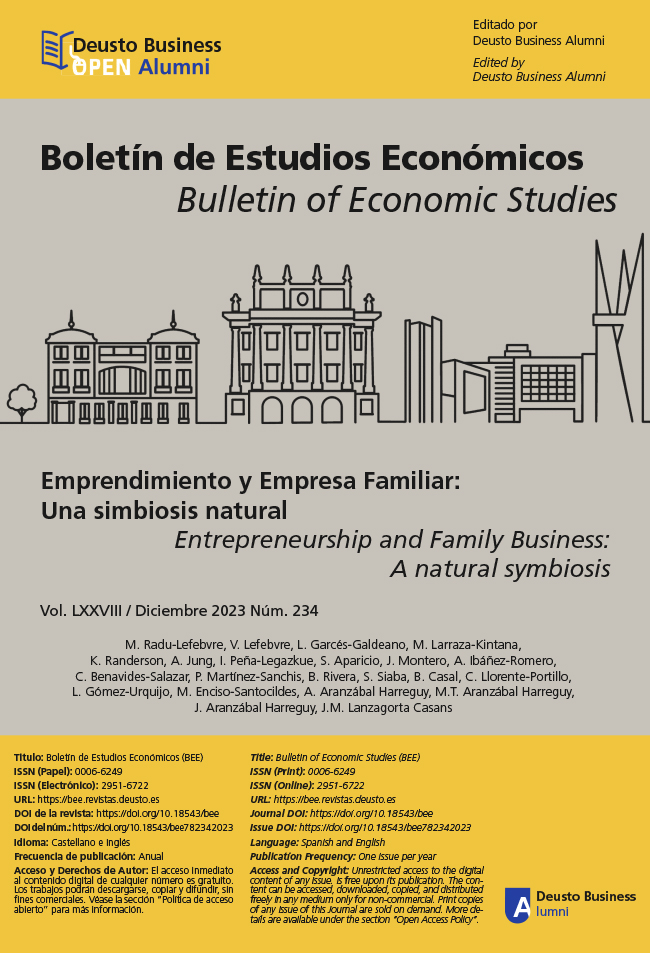Family Businesses in the Basque Country, a Social Asset to Be Preserved for the Development of the Region
Abstract
Family businesses in the Basque Country are of vital importance to the Basque business fabric, representing 84% of said fabric and contributing significantly to employment and added value in the region. These companies, apart from their economic relevance, are characterized by their deep-rooted values, commitment to sustainability and distinctive management. The Basque Country’s Family Business Association (AEFAME) works to highlight their social value by promoting collaboration, developing a favorable ecosystem and designing an active governance. The continuity of these companies is ensured through attention to family governance and fostering entrepreneurial commitment among future generations. Collaboration with academic and governmental institutions is also pivotal to strengthen and sustain this business model embedded in the region, bolstering its sustainable development and contribution to social welfare.
Received 20 July 2023
Accepted: 11 October 2023
References
Amato, S., Patuelli, A., Basco, R., & Lattanzi, N. (2023). Family firms amidst the global financial crisis: A territorial embeddedness perspective on downsizing. Journal of Business Ethics, 183(1), 213-236. https://doi.org/10.1007/s10551-021-04930-0
Aragón-Amonarriz, C., Arredondo, A. M., & Iturrioz-Landart, C. (2019). How can responsible family ownership be sustained across generations? A family social capital approach. Journal of Business Ethics, 159, 161-185. https://doi.org/10.1007/s10551-017-3728-7
Benavides-Salazar, C., Iturrioz-Landart, C., Aragón-Amonarriz, C., & Ibáñez-Romero, A. (2021). The role of entrepreneurial families in entrepreneurial ecosystems: The family social capital approach. Journal of Entrepreneurship in Emerging Economies, (ahead-of-print). https://doi.org/10.1108/jeee-11-2020-0416
Corona, J. (2015). La empresa familiar en España. Instituto de la Empresa Familiar, Barcelona.
Habbershon T. G., & Williams M. L. (1999). A resource-based framework for assessing the strategic advantages of family firms. Family Business Review, 12(1), 1-26. https://doi.org/10.1111/j.1741-6248.1999.00001.x
Lenz, R. (2021). Family firms and their regional ties: A bond made for the future?. In Family Business and Regional Development (pp. 125-139). Routledge. https://doi.org/10.4324/9780429058097-10
Martínez-Sanchis, P., Iturrioz-Landart, C., Aragón-Amonarriz, C., Radu-Lefebvre, M., & Seaman, C. (2021). Institutional settings and local embeddedness of European entrepreneurial families: an inter-regional comparison. European Planning Studies, 29(10), 1819-1844. https://doi.org/10.1080/09654313.2021.1889474
Martínez-Sanchis, P., Aragón-Amonarriz, C., & Iturrioz-Landart, C. (2022). How does the territory impact on entrepreneurial family embeddedness?. Journal of Enterprising Communities: People and Places in the Global Economy, 16(2), 196-217. https://doi.org/10.1108/jec-09-2019-0087
License:
Works published in this journal are available since 2021 under the Creative Commons Attribution-NonCommercial 4.0 International license - CC BY-NC 4.0. Content prior to 2021 is not covered by the journal's current Open Access policy.
Authors' Rights:
Authors retain copyright over their work published in the Bulletin of Economic Studies and grant the Bulletin of Economic Studies non-exclusive rights to exploit the work for layout, publication, and dissemination purposes. This license allows the Bulletin of Economic Studies to distribute, reproduce, and disseminate the work on its platform and through other media, subject to the conditions outlined in this notice.
Readers' Rights:
Readers may read, download, print, search, share (copy, redistribute, or link to full text), or adapt (remix, transform, and build upon the material) the content, provided that:
- The materials are not used for commercial purposes.
- The original work is properly cited, including the name of the author and the source.
- Any modifications made to the original content are clearly indicated.
Commercial use of the materials is prohibited without the express permission of the authors. For clarity, commercial use is defined as any activity intended for financial gain or involving direct commercial exchange.
Conditions of Use:
The use of content must not infringe the rights of others or be used in a way that could damage the reputation of the author or the Bulletin of Economic Studies.
Responsibility for Content:
Authors are responsible for the content of their papers and the Bulletin of Economic Studies is not responsible for the opinions therein expressed.
More Information:
Open Access, Licensing, and Copyright Policy


.jpg)
.jpg)
.jpg)








